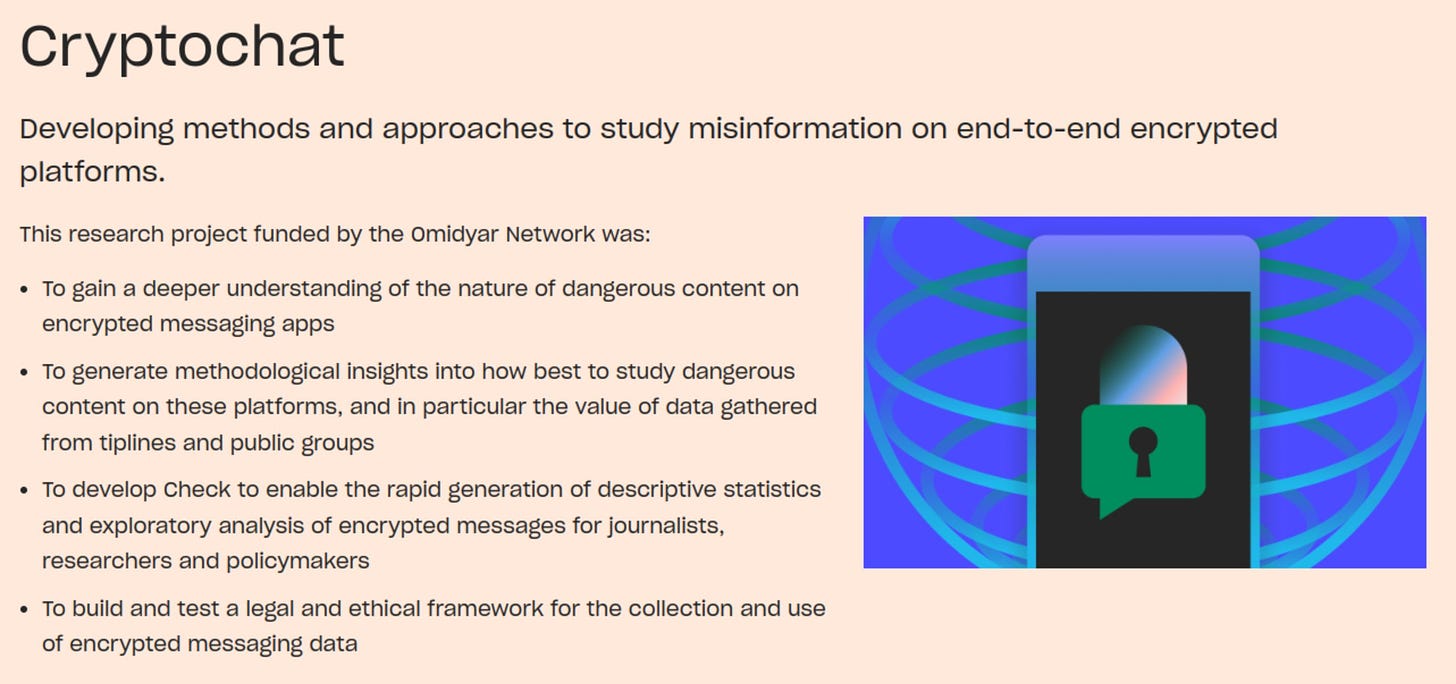by Michael Shellenberger, Public:
 The Censorship Industrial Complex wants to censor “problematic content” on WhatsApp, Signal, Telegram, and other encrypted text messaging apps
The Censorship Industrial Complex wants to censor “problematic content” on WhatsApp, Signal, Telegram, and other encrypted text messaging apps
Ever since journalist Matt Taibbi and I testified before Congress on April 10, critics of the Twitter Files have claimed that we were making a big deal about nothing. We were being paranoid, they said, to imagine that the U.S. government was involved in spying on ordinary Americans and demanding censorship. The various groups involved in what we called the Censorship Industrial Complex were merely “flagging” problematic posts for social media companies, said our critics. The platforms were by no means required to act on it.
TRUTH LIVES on at https://sgtreport.tv/
Yet act on it, they did. As I noted in our video about CIA Fellow Renee DiResta, who oversaw the Censorship Industrial Complex’s effort to censor disfavored speech and disfavored users in 2020 and 2021, the social media companies responded to 75% of flagged posts and acted on one-third of them.
And now, new information has come to light that the censorship activists are trying to spy on and censor even supposedly encrypted text messages through apps like What’s App, Signal, and Telegram.
“There is currently no easy way to discover potentially problematic content on WhatsApp and other end-to-end encrypted platforms at scale,” lamented censorship advocates in a January 2022 Omidyar Foundation report. “One potential solution is to make use of misinformation ‘tiplines’ to identify potentially misleading or otherwise problematic content… On WhatsApp, a tipline would be a phone number to which WhatsApp users can forward potential misinformation they see to have it fact-checked.”
That sounds innocent enough. Apps like Amazon Kindle allow people to look up words in dictionaries and encyclopedias. Why not let them to look up whether things are factual?
Because the “tipline” was just the tip of the iceberg. A “think tank” called “Meedan,” which was one of Twitter’s principal “anti-disinformation partners” on Covid, created a project called “CryptoChat,” which advocated spying on encrypted chats to hunt down out wrongspeak. Andrew Lowenthal, the founder of the Digital Civil Liberties initiative and a colleague of Taibbi’s, discovered this program.

The Omidyar Foundation, created by Ebay founder Pierre Omidyar, has advocated the spying on and censorship of encrypted wrongspeak. “Reports of violence, disinformation, and manipulation campaigns originating on private messaging platforms have become all too common,” warned Omidyar Foundation in a January 2022 report. “Not only are individuals’ lives and liberties impacted, but dangerous platform design choices also have devastating implications for our democratic institutions and the health and well-being of our societies.”
In late 2021, Wired, the formerly libertarian magazine that now champions surveillance and censorship, called for spying on private messaging in the name of preventing harm. Encrypted messaging apps “are intentionally built for convenience and speed, for person-to-person communication as well as large group connections,” wrote Wired. “Yet it is these same conditions that have fueled abusive and illegal behavior, disinformation and hate speech, and hoaxes and scams; all to the detriment of the vast majority of their users. As early as 2018, investigative reports have explored the role that these very features played in dozens of deaths in India and Indonesia as well as elections in Nigeria and Brazil.”
The Omidyar report explicitly argued against the right to privacy in text messaging. “Privacy is essential to building trust, but it is not a singular standard for safety,” wrote Omidyar Foundation authors. “We believe online safety is the result of trustworthy technology and enlightened regulation. While the shift toward adopting end-to-end encryption has reinforced trust between users, the technological architecture that encourages scale, virality, and monetization has ultimately facilitated the rapid and large-scale spread of dangerous, distorted, and deceitful content.”
It is a shocking statement to read, especially when you realize that Omidyar, with a net worth of $9 billion, has long claimed to be a champion of free speech and privacy. He even bankrolled the online magazine, The Intercept in response to revelations by Edward Snowden that the U.S. government was illegally spying on American citizens. What is going on here? Why is the censorship industry now trying to spy on and censor our private messages?
Read More @ public.substack.com




